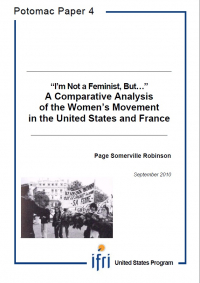‘‘I'm Not a Feminist, But…'', a Comparative Analysis of the Women's Movement in the United States and France Potomac Paper, No. 4, September 2010
The emergence of a feminist thought in the 18th century gave rise to steady and regular exchanges between French philosophers and American activists. They illustrate in a very particular sector the wealth of the relation between both countries. This dialogue continues on renewed bases today: both in universities (with the exploration of the concept of gender) and in the militant world (with the defense of precise and limited causes).

From the pre-revolutionary era, French and American feminists have engaged in a nearly constant exchange of correspondence and theory. French and American feminist movements thus converged on a number of issues, such as education, divorce and inheritance rights, the fight for suffrage, and reproductive rights.
By the early 1980s, however, a rift developed between French and American feminists caused by misleading academic analyses and misrepresentations in media coverage. American feminists became widely associated in French intellectual circles with manhating radicalism. Conversely, American circles began to correlate French feminism with a primarily differentialist intellectual movement lacking an activist arm. These limited understandings led many to discount the richness and diversity of feminist movements in France and the United States.
This falling-out is not representative of current evolutions however. On the one hand, academic studies on feminism have found a new dynamic in the emergence of Gender Studies; on the other hand, feminist activism remains very much alive, organizing around a number of issues such as equality in the workplace, rights for immigrant women, and stopping violence against women.
Gender Studies are now exploring a number of remaining deep-seated issues, such as whether or not there are essential differences between men and women, and if so, how they are made manifest. Activists also contend with a longstanding tension between social movements and the feminist struggle – as feminists may also be involved in labor movements, for example, how should they prioritize their efforts? Last but not least, with many young women refusing to be called feminists, yet supporting feminist causes, the notion itself may need to be overhauled.
A French-American dialogue on these issues has started afresh. The advent of new media provides a backdrop against which feminists may represent themselves and renew important debates far from misrepresentations.


